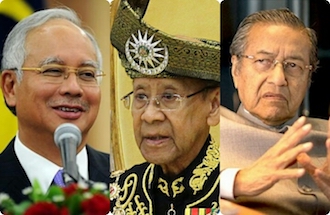Is the King a captive of the Prime Minister?

Dr. Mahathir’s allegations that the Yang Di Pertuan Agung (YDPA) being held prisoner to the Prime Minister of Malaysia Najib Razak is mischievous, irresponsible and an untenable claim without proper legal or factual foundation.
(Malaysia Outlook) – Dr. Mahathir’s allegations that the Yang Di Pertuan Agung (YDPA) being held prisoner to the Prime Minister of Malaysia Najib Razak is mischievous, irresponsible and an untenable claim without proper legal or factual foundation.
The Federal constitution (Constitution) of Malaysia is clear that although all of government including the prime minster, all its other arms including the judiciary and legislature are referred to as ‘YDPA’s’ by appointment, by the convention, ultimate power in all things constitutional, executive and government resides with parliament and not with the YDPA. The YDPA’s role remains largely ceremonial and there is nothing in the Constitution that gives him any power or authority to dismiss a prime minister. The YDPA executes all his duties and functions on the advise of his prime minister (and his ministers) from whom he receives his counsel. Parliament remains sovereign.
As an example of how parliamentary sovereignty works (and overrides other powers including that of the king and constitution), in 1914 during the first world war the sitting Parliament in the UK instead of dissolving itself passed an Act extending its own life. There are many more examples where parliament’s power trumps that of the monarch or anyone other arm of government and the constitution.
At any rate, Bagehot’s famous statement on the limited rights of the monarch remains relevant today in Malaysia as it always has is in the UK. The powers of the monarch are as he put it, limited to’ consult, to encourage and to warn’.
In the context of the Constitution government is elected by the people but appointed by the YDPA (ministers and prime ministers) providing “they command the confidence of the majority of the House”.
The Constitution including Article 43(4)the only relevant Article on this point in contention is silent on the question of removal. It instead makes reference to a situation where the prime minister ‘ceases to command the confidence of the majority of the House of Representatives’ as far as his claim to the office is concerned. It makes no reference implied or express to any power therein in the YDPA to remove the prime minister even in such a situation where the prime ceases to command the confidence of the majority in the House. In fact there is no power or authority in the YDPA to remove a prime minister.
The YDPA has limited discretionary powers in appointment of a prime minister as he is only nominal head of executive government. The convention that the YDPA must always act on the advise of his government has always been followed in Malaysia, although constitutionally the prime minister has the power to act without consulting the YDPA.
In practice and by convention, it is the YDPA who holds office at the pleasure of parliament and it’s the prime minister and not the other way round as is suggested by some. Parliament is sovereign. Parliament can make or unmake a King or a Queen: and as Blackstone reminds us:
“Parliament has sovereign and uncontrollable authority in the making, confirming, enlarging, restraining, abrogating, repealing, reviving and expounding of laws concerning matters of all possible denominations ecclesiastical or temporal, civil, military, maritime or criminal. This being the place where that absolute despotic power, which must in all Governments reside somewhere, is entrusted by the Constitution of those kingdoms”.

